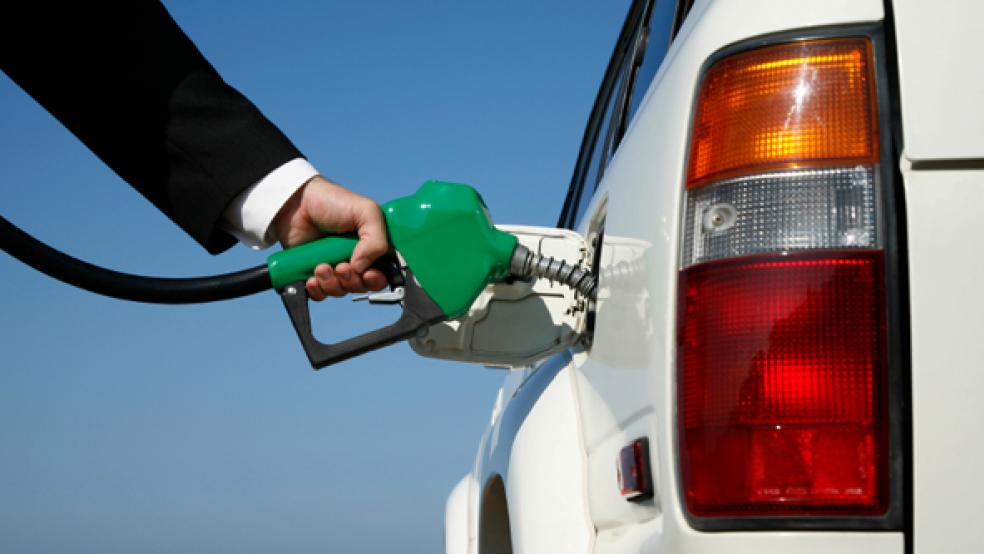Speaker Nancy Pelosi (D-CA) and Senate Minority Leader Chuck Schumer (D-NY) announced Monday that President Donald Trump has agreed with Democratic lawmakers to pursue a massive infrastructure deal worth upwards of $2 trillion over 25 years. Democratic leaders will meet with the president again in three weeks to discuss how to pay for such a plan, with the White House on the hook for generating funding proposals.
“The ball is in their court,” Schumer said Monday after meeting with the president. “We told him that, it was repeated over and over again, that unless he is willing to come up with the pay-fors for this large package, it will never get done, and he agreed.”
Where can the White House turn for revenues to help fund such a massive infrastructure plan? Bloomberg’s Laura Davison and Mark Niquette say that the gas tax is one obvious place to look. The tax hasn’t been raised since 1993, leaving the U.S. with some of the lowest fuel taxes in the developed world – 18.4 cents per gallon of gasoline and 24.4 cents per gallon of diesel. But actually raising the tax won’t be easy. Here’s why:
1) The gas tax is politically fraught: Federal fuel taxes have remained frozen largely because U.S. lawmakers see any increase as a surefire political loser. The gas tax is regressive, hitting low-income households the hardest, and politicians on both the left and the right have expressed concerns about imposing new taxes on working-class voters. The opposition to a fuel tax hike has created some strange bedfellows, Davison and Niquette say, including Senator Elizabeth Warren (D-MA) on the left and various members of the House Freedom Caucus on the right.
Although the president’s backing could make a big difference – Trump supporter Rep. Chris Collins (R-NY) spoke in favor of doubling the gas tax this week – the dealmaking will be a challenge. Schumer said he would consider a gas tax hike only if President Trump agreed to roll back some of the 2017 tax cuts as well. Senate Majority Leader Mitch McConnell said that approach would be “a non-starter.”
2) It won’t raise enough money. The federal fuel tax generated about $36 billion in revenues in 2016. Raising the tax by 25 cents a gallon would more than double the revenue, bringing in another $394 billion over 10 years, according to an analysis the U.S. Chamber of Commerce, which supports the idea. The Tax Foundation is less optimistic, finding that a 50 cent per gallon increase would generate about $306 billion over a decade. But either way, the increased revenue falls well short of what Pelosi, Schumer and Trump are contemplating. And the Highway Trust Fund, which is already in the red, would likely siphon off some of that money for ongoing maintenance, leaving less available for new projects. To top it off, there are legal restrictions on the kinds of projects fuel taxes can be used to pay for.
3) There are competing alternatives. Taxing fuel may be losing some of its appeal as electric vehicles become more prevalent. Rep. Mario Diaz-Balart (R-FL) spoke out against a fuel tax hike Tuesday: “I don’t think that is the way forward. The Highway Trust Fund is deficient because of a change in technology. We have more efficient automobiles, electric automobiles, we have hybrids — that’s not going to change.”
Rep. Chris Pappas (D-NH), who sits on the Transportation and Infrastructure Committee, called for a tax based on mileage driven rather than fuel consumed. "I think longer term — in terms of funding our roads and bridges, we all agree that vehicle miles travel is a great way to look for revenue, we’re all driving more fuel-efficient vehicles and so the gas tax has less and less purchasing power," Pappas told The Hill Tuesday.
However, a new tax based on use rather than fuel consumption is still years away, experts say. So lawmakers may find themselves without a viable option for raising revenues, stuck between the existing fuel tax that’s too difficult to increase and a use-based tax that cannot yet be implemented.




